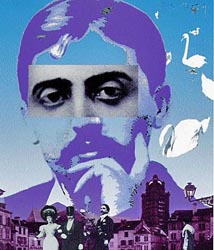26. Proust : we do not receive wisdom, we must discover it
--------------
Previous - Next - Contents
Olivier Philipponnat & Patrick Lienhardt (who discovered the
original Fire in the Blood manuscript) state in their Foreword
to the book that
Irène Némirovsky was greatly inspired
for 'Fire in the Blood' after rereading these "marvelous words" by Marcel Proust in his book Within a Budding
Grove ("A l'ombre des jeunes filles en fleur"). "They seemed to
express to perfection the subject that preoccupied her" :
We do not receive wisdom, we must discover it for ourselves, after a
journey through the wilderness which no one else can make for us, which
no one can spare us, for our wisdom is the point of view from which we
come at last to regard the world.
The lives that you admire, the
attitudes that seem noble to you, have not been shaped by a
paterfamilias or a schoolmaster, they have sprung from very different
beginnings, having been influenced by everything evil or commonplace
that prevailed round about them. They represent a struggle and a
victory.
| 
|
I too find this a wonderfully creative and inspiring description of
wisdom and can strongly identify with it. In fact it largely
overlaps what I in this Blog have called awareness. It does not
come to you, you have to go out and search for it, struggle and decide
what is true and what is false.
 The online Wikipedia Encyclopedia contains another gem of a
definition for 'wisdom'. It states :
The online Wikipedia Encyclopedia contains another gem of a
definition for 'wisdom'. It states :
|
A standard philosophical,
(philos-sophia: literally "lover of wisdom"), definition says that
wisdom consists of making the best use of available knowledge.
As with any decision, a wise decision may be made with
incomplete information. |
This definition clearly links wisdom and knowledge
together in a kind of mental production chain. Knowledge and experience are the "fuel" that drives the "verhicle" (philosophical method)
to its
ultimate "destination" : wisdom. What this wisdom amounts to is of course entirely up to you, as unique individual, because it is you who gathers the fuel and who drives the vehicle.
Philosophy (as defined in the Wikipedia Encyclopedia) is the study of general
problems concerning matters such as existence, knowledge, truth,
beauty, justice, validity, mind, and language. Philosophy is
distinguished from other ways of addressing these questions by its
critical, generally systematic approach and its reliance on
reasoned argument.
 My Concise Oxford Dictionary contains several definitions of the
word. Here is the first and most specific one, which subtly hints at
a kind of split which has opened up (over the past 200 years or so ?)
between traditional philosophy and the philosophy of the
natural sciences. Here it is :
My Concise Oxford Dictionary contains several definitions of the
word. Here is the first and most specific one, which subtly hints at
a kind of split which has opened up (over the past 200 years or so ?)
between traditional philosophy and the philosophy of the
natural sciences. Here it is :
Philosophy = seeking after
wisdom or knowledge,
especially that which deals with ultimate
reality.
The word "or" above suggests that there are two separate routes
that can lead to that "ultimate reality". One through general
philosophy (based on general knowledge, experience and reason), the
other through the search, analysis and discoveries in the fields of the
natural sciences.
When I studied and graduated in Geology we were (together with
the other natural sciences like biology, physics, chemistry, astronomy)
part of the Faculty of Philosophy at Leiden University.
The
essential criteria for a school of learning to belong to that Faculty
was that its underlying directional aim was to find an answer to
that elusive ultimate reality. Significantly the School of
Philosophy ("Wijsbegeerte" in Dutch, meaning "desire for wisdom") was not part of the Faculty
(neither were Theology, Law, Medicine, Psychology, etc.). (I state
the above in the past tense as I am not sure whether the situation is
still
the same. One can become a "Doctor in Philosophy" (PhD) in just about
any Tertiary School of learning these days.)

|
Nevertheless the split is still there, and I clearly perceive some
considerable animosity between the two camps (as revealed in their
writing). Ever since Socrates general philosophy has been top
dog in the field.
However these last 200 years or so they have been
increasingly sidelined
- because traditional philosophy has now become such a specialist
field,
that only professionals can grasp it, and
- through the spectacular developments in the natural sciences (with
breakthroughs by the likes of
Galileo, Darwin, Wegener, Newton, Einstein and others) which are
generating deeper insights into the evolution of life, the earth and
the universe.
|
It are (I believe) therefore the natural
sciences that are providing the "super fuel" which
slowly but inevitably will power the philosophy "vehicle"
closer towards its so elusive destination : a maturing wisdom and understanding of the true "ultimate
reality".
Now, through the popular writings by Brian Greene (The Fabric of the Cosmos),
Richard Dawkins (Books, CDs, News) and others, it opens up these new evolving ideas to ordinary people like you and me (meaning : non specialists in these fields), to all those who are interested in and in search of that "ultimate reality".
PS
Traditional philosophy will always have a function in many aspects of human society (like politics, ethics, etc.), but to tackle the ultimate reality it requires more than just ordinary daily experiences and reason. It needs to be complemented by the knowledge wrestled from observations, investigations, discoveries of the world and universe around us to come closer to that goal.
Next Page -
Top of Page
Copyright © 2010 Michael Furstner
|



